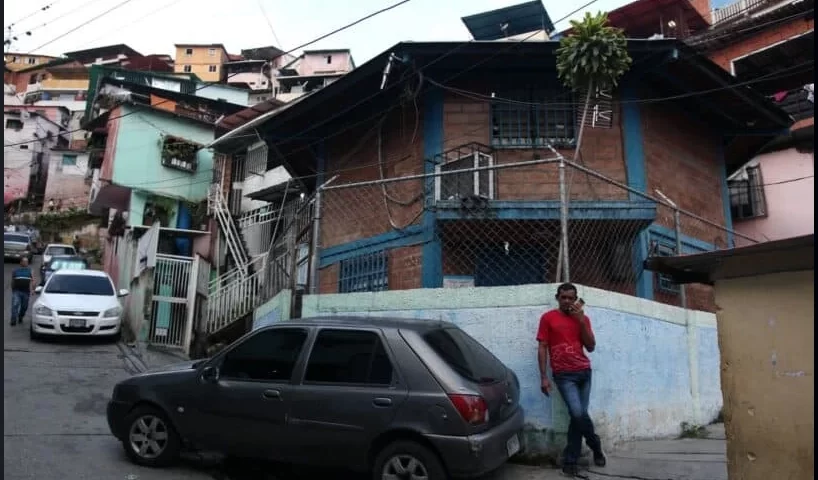by Celina della Croce, published on MROnline, August 18, 2023
On March 26, 2022, Francisco lay in a public hospital bed in Bolívar, Venezuela, roughly eight hours inland from the capital of Caracas. He had been waiting for more than twenty-four hours to be seen by a doctor for fluids filling his stomach in a hot room with no fan or air conditioning. By then he was stick thin, his skin clinging to his bones as he lay on his side, waiting.
When he was finally seen by a doctor and given a prescription, he was also told that the hospital did not have the medicines he needed. His family would need to try to find them on their own. At the pharmacy, the initial prescription totaled $35 (well beyond the monthly earnings of many), in addition to the $5 the family had already spent on saline solution—of which the hospital had run out. Though public pharmacies are available in many places throughout the country with subsidized prices, they don’t always have access to the medicines needed, or if they do (especially as the worst of the shortages has subsided), even the lower prices—for medicines that were once free—are unattainable for many.
In fact, UN Special Rapporteur Alena Douhan reported in 2021 that Venezuela was experiencing 85 percent shortages of medicine, according to the national pharmaceutical federation while high-cost procedures such as heart surgery, dialysis, and cancer treatment remain especially out of reach—a result of sanctions imposed and increasingly tightened as part of the U.S. “maximum pressure campaign” since 2017. For the same reason, Venezuela has experienced a 45.7 percent decrease in the number of registered doctors, leaving public hospitals with 50 to 70 percent shortages of qualified medical personnel and up to 80 percent of hospital equipment in disrepair, much of which is missing parts that were once imported from the United States. In other cases, the purchase of equipment from other countries has been blocked by the U.S. sanctions, which prevent other countries from doing business with Venezuela lest they be punished with the same sanctions as a result.
This would explain why, when Francisco’s roommate—who was in for a collapsed lung after a surgery-gone-wrong at a private clinic, where he could not afford to continue receiving care that would have cost in the realm of $1,000 a day—was told he needed an x-ray, he was also told that the hospital had no working x-ray machines and he would have to seek out and pay a private lab that had working equipment. Since the hospital only had one wheelchair and was severely understaffed, his family would also need to arrange transportation since he was in no condition to walk.
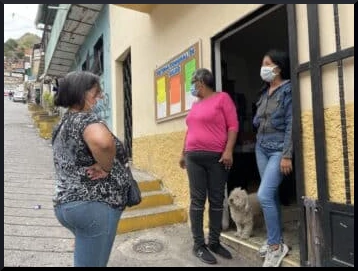
Meanwhile, Francisco waited with his daughter-in-law and his son, who had been out of work for some time. Two weeks later, on April 12, Francisco died, unable to get the medical tests he needed that could have helped diagnose and treat his condition.
In a single year, 40,000 people in Venezuela, like Francisco, died as a result of the U.S. sanctions that have devastated the country’s ability to import medicines and export key goods such as oil, paralyzing the economy and stunting the country’s ability to meet the basic needs of the population. The same year, another 300,000 people were at risk of dying because they were not able to access essential medicines for diabetes, cancer, HIV, kidney disease, and other treatable conditions for more than a year. Many have left the country in search of accessible medicine, while many others have died, as Alexis Bolívar of Rompiendo la Norma reported in the case of those with HIV/AIDS, the brunt of which have been disproportionately borne by the LGBTQ+ community.
The timeline that I have heard over and over again—from people of all political persuasions including family members of patients, the wheelchair attendant who spoke to me about the breaking-down elevators with missing doors, and members of communes across the country—coincides with the years that the United States ramped up its maximum pressure campaign against Venezuela under Donald Trump, allegedly propelled by a concern for human rights over the country’s democracy and electoral process. But not only has this rhetoric proved, again and again, to be false—Trump himself dispelled the myth, declaring in June 2023: “When I left [office], Venezuela was ready to collapse. We would have taken it over. We would have gotten all that oil. It would have been right next door.” This declaration echoed a statement made by his secretary of state Mike Pompeo four years earlier that “We always wish things could go faster.… The circle is tightening, the humanitarian crisis is increasing by the hour.… You can see the increasing pain and suffering that the Venezuelan people are suffering from.”
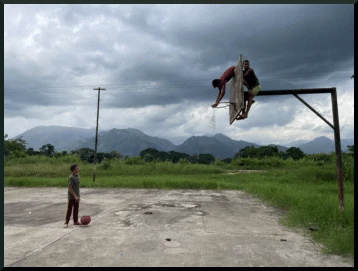
Based on a bilateral study of thirty-six other oil-producing countries, economist and opposition supporter Francisco Rodriguez found that, beginning with Trump’s 2017 blanket sanctions on Venezuela’s oil sector, “the collapse in Venezuela’s oil production is of a dimension seen only when armies blow up oil fields,” explaining that “the only country that suffered a change in trend similar to Venezuela in that period was Yemen, whose oil fields were the target of a Saudi bombing campaign at the time.”
According to figures released the following year, the U.S.-imposed sanctions caused the government’s revenue to shrink to a mere 1 percent of what it had been before the sanctions—in other words, a 99 percent decrease. A 2023 government report estimates that “since 2015, Venezuela lost on average $40 billion per year” while the production of the state oil company PDVSA—the source of most of the country’s social spending—fell by 87 percent from January 2015 to June 2020 as a result of the U.S. blockade.
The situation has improved slightly, but the government’s ability to fund social programs remains a shadow of what it once was as a result of the U.S. blockade. As the report explains, “although the country experienced a slight recovery between 2021 and 2022, the income of the latter year represents only 10% of what Venezuela received in the year when the economic aggression began.” As economist Pasqualina Curcio puts it, the resources lost as a result of the economic war from 2016 to 2019 alone could have provided “resources sufficient to import enough food and medicine for 45 years” or fund the health system (both public and private) for twenty-nine years.
Furthermore, Rodriguez notes that “Venezuela’s deep deterioration in health, nutrition, and food security indicators occurred alongside the largest economic collapse outside of wartime since 1950,” with a 31 percent increase in mortality the year after the sanctions were imposed. By March 2020, former UN Special Rapporteur Alfred de Zayas estimated that 100,000 Venezuelans had died as a result of the sanctions.
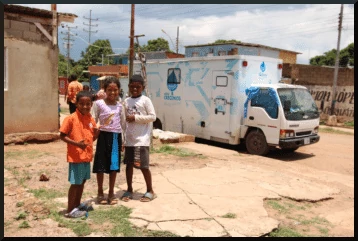
The hospital where Francisco was admitted, like others across the country, is a shell of what it once was: a robust, free, and well-stocked facility with quality doctors that tended to its patients with care in a country with one of the highest human development indexes in the world. This is because, after the Bolivarian Revolution in 1999, the government began to dedicate 75 percent of its resources on social spending, a 50 percent increase from what it had been previously. Among these programs, largely funded with oil revenues, are Mission Barrio Adentro, setting up health clinics in 320 of Venezuela’s 355 municipalities; Mission Sonrisa, providing free dental care; and Mission Milagro, restoring the eyesight of some 300,000 Venezuelans and providing eye surgery to 1 million.
But these programs and many others were shattered with the U.S. sabotage of the Venezuelan economy, following Richard Nixon’s old mandate to “make the economy scream” as a key part of the strategy for regime change. As an independent expert wrote in a 2018 UN report, “Modern-day economic sanctions and blockades are comparable with medieval sieges of towns with the intention of forcing them to surrender. Twenty-first century sanctions attempt to bring not just a town, but sovereign countries to their knees.”
Three years later, UN Special Rapporteur Douhan released a report on the impact of unilateral coercive measures in Venezuela, concluding, among other key points, that “the tightening of sanctions from 2017 undermined the positive impact of the multiple reforms and the State’s capacity to maintain infrastructure and continue to implement social programmes.” The report shows, for example, that as a result of these measures, the children’s heart hospital, which Douhan refers to as the most modern in the country and which handles 90 percent of children’s heart operations nationwide, decreased its surgeries by 94 percent from 2015 to 2020. Meanwhile, at the J. M. de Los Ríos children’s hospital in Caracas, the main hospital treating children from outside the capital, “care in several of its 34 specialist areas is reportedly no longer available. The hospital lacks basic medicine, medical equipment and instruments, and can no longer provide food for the patients. Patients requiring oncology and haematology services cannot receive complete treatment, which has forced families to seek supplemental treatment elsewhere—if they can afford it. Here again, the poorest are the most affected.”
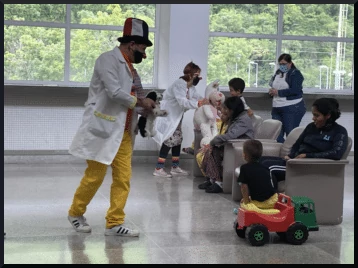
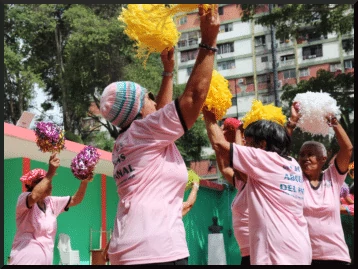
Venezuela is by no means an isolated case, though it is one of the most severe. According to 2021 data from the U.S. Treasury Department, U.S. sanctions have increased by 933 percent over the last twenty years, meaning that nearly a third of the world economy and one-fourth of the countries in the world are subjected to them. If the U.S. can’t win with tanks and guns, it calculates, perhaps a campaign to suffocate the people will expedite regime change.
Despite killing tens of thousands, and despite figures of everyday life only comparable with battlefields, the sanctions have not been able to strip joy from the life of Venezuelans, nor have they been able to accomplish their objective of regime change. While getting sick may very well cost the average Venezuelan their life as a result of the devastating U.S. blockade, it has not been able to stop the plazas from filling with music, theater, and bustling life. Nor has it hampered the warmth, ingenuity, and resilience of its people, who refuse to be beaten down.
*Featured Image: August 2023. A passerby in the 5 de Marzo Commune in Caracas stands in front of the Barrio Adentro (“Inside the Neighborhood”) clinic, a government created and funded mission that provides free primary health care in many working class neighborhoods across the country. Author’s photo.
Celina della Croce is the publications director at Tricontinental: Institute for Social Research as well as an organizer and activist.
